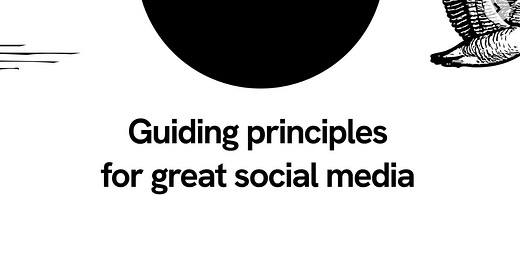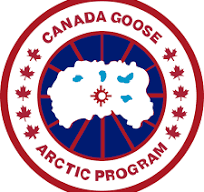“Canada is building its own social network” read the May 23 headline in The Logic, a Canadian business and technology publication. The lede:
Ben Waldman didn’t set out to build a social media platform—then along came U.S. President Donald Trump’s trade war and threats of turning Canada into the “51st state.” For Waldman, an Ottawa-based creative director used to working with museums and nonprofits, the rhetoric triggered a bunch of fears, including over Canada’s digital dependence on its noisy neighbour.
Waldman’s solution: “a global social network that’s built on Canadian values and laws” that is “a digital reflection of the ‘Elbows Up’ vibe, but will also create a much-needed space to elevate Canadian voices.”1
He’s calling it Gander.

Those Canada geese in the illustration remind us that a lower-case gander is a male goose. A perfect name and symbol, right? Well, there’s a lot more to the story.
For you etymology buffs, here’s what the OED says about gander’s history:
Although used as the masculine of goose n. (Old English gós < Old Germanic *gans-) there is some doubt whether it is etymologically cognate with that word. While goose represents an Old Aryan *ghans- with palatal gh-, it is possible that Old English gan(d)ra may be cognate with Lithuanian gàndras stork; this would imply a root beginning with velar gh-, to which may also be referred Old English ganot gannet n., Old High German ganaȥȥo, ganȥo (Middle High German ganȥe, also genz), Dutch gent, all meaning ‘gander’.
A more interesting part of the entry, to me anyway, is this:
It has been conjectured that gander may have been originally the special name of some kind of water-bird, and that its association with goose is accidental, perhaps arising from the alliterative phrase ‘goose and gander’.
You may know “goose and gander” from the old saying (circa 1670) “What’s sauce for the goose is sauce for the gander” — a “chiefly British” idiom, according to Merriam-Webster, that translates to “one person or situation should be treated the same way that another person or situation is treated,” or “turnabout is fair play.” But did you know that goosestep has been around since at least 1806, when it described a military drill to teach balance? It meant “to stand on each leg alternately and swing the other back and forth.” “This, presumably, reminded someone of a goose’s way of walking,” says Etymonline, which adds: “In reference to ‘marching without bending the knees’ (as in Nazi military reviews) it apparently is first recorded 1916.”
I haven’t found a name-origin story for the new social-media Gander, but on the surface it’s a reasonable choice. Consider the alternatives: Among the major Canadian charismatic fauna, loon is already associated with the one-dollar coin (“loonie”), and beaver had a long history as a Canadian publication (The Beaver, founded in 1920 by the Hudson’s Bay Company and absorbed in 2010 into Canada’s History)2. Moose show up in Moose Knuckles, the Montréal-based sportswear company “inspired by our nation’s most fearless animal who only leaves a trace of its knuckle in the snow.”3
Geese, too, are well represented in brandland. DuckDuckGo, the U.S. search engine, chopped off the -ose from the children’s game “duck, duck goose” to create its name. Goose & Gander is a UK-based unisex clothing brand. And the Canada goose4, Branta canadensis, is a brand name as well: Canada Goose “performance luxury apparel,” founded in 1957 in Toronto and known for making parkas warm enough to endure arctic temperatures.
For social media, Gander has the added advantage of a secondary meaning: “a look, a survey.” This sense originated in the U.S., circa 1914; to “take a gander” at something is to crane your neck like a goose, and yes, that’s a turducken of a mixed avian metaphor.
“Native bird” plus “looking around” equals a nicely apposite name for a social-media network that’s all about national pride and sovereignty.
There’s one little problem with Gander, though: It’s also the name of a town and a lake in the Canadian province of Newfoundland and Labrador.

The town of Gander may be small — population 11,880 as of 2021 — but it punches well above its weight. The town, which took its name from nearby Gander Lake5, which in turn was named for its resident geese, was chosen in 1935 as the site of an international airport because of its proximity to the great circle route and its potential as a transatlantic refueling stop. The first landing at what is now called Gander International Airport took place on January 11, 1938.
Gander was an important Royal Air Force base during World War II, but it was in the period immediately following the September 11, 2001, attacks on New York and Washington, when flights into those cities were diverted, that the town became the focus of international attention.
From a Wikipedia entry:
As part of Operation Yellow Ribbon, 38 civilian and 4 military flights bound for the United States were ordered to land at the airport—more flights than any Canadian airport other than Halifax International. More than 6,600 passengers and airline crew members—equivalent to 66% of the local population at the time—were forced to stay in the Gander area for up to six days until airspace was reopened.
The episode was turned into a long-running musical, Come from Away, which opened on Broadway in 2017. I saw it in San Francisco in early 2019, during the first national tour. It remains one of the most powerfully moving theatrical events I’ve ever experienced. I actually wept, and I am not a weeper. I immediately bought a ticket to a repeat performance the next week, and I’ll see it again if the opportunity presents itself.
So here’s my question: Should the town of Gander welcome or protest the appropriation of its name by an upstart website? To put the question in legal terms, is there likelihood of confusion? Will Canadians assume that Gandersocial.ca is created by and for residents of Gander — exclusively?
I have no inside information, so I can only hope that the issue was cleared up before Gander the social network went live. I do know about a handful of other Gander trademarks in the U.S. database, including a creative agency in New York (takeagander.com) and an “elevated contemporary wear” company in the U.K. (gandergander.co.uk). No trademark filings in the U.S. for Gander Social, though.
Nor would I expect there to be. This is, after all, a proudly Canadian Gander, a Gander that quotes the national anthem and promises “no foreign owners or overseas interests.”
And because imitation is the sincerest form of entrepreneurism, there’s more CanCon on the tech horizon. From that May 25 story in The Logic:
Waldman isn’t the only Canadian building a social network. B.C.-based tech entrepreneur Jessica Glowacki is preparing to launch Eh!, a mobile-first social app focused on local discovery.
“It’s built for the hustlers, the dreamers, the community builders,” Glowacki said. “It’s people who want to be seen. The small businesses. And you know what? It’s really hard to be seen right now.”
Yep, Eh!, the classic Canadian confirmational. The site proclaims itself “unapologetically Canadian.” This American unapologetically approves. Happy Canada Day (July 1) to all who celebrate!
And now, a local angle:
For centuries, maybe millennia, Canada geese passed through Oakland, California, on their annual migrations, often stopping to graze at Lake Merritt, home of the oldest wildlife refuge in the U.S. Then, in the 1950s, some naturalists captured nine Canada geese from a farm in Dixon (Solano County) and brought “these desirable birds” to the lake as an attraction. The rest was history, and biology: There are now some 2,000 Canada geese in permanent residence around the lake. Why fly north when Bay Area life is so agreeable, the climate so temperate? Watch your step on the paths: our large feathered friends are prodigious poopers.

For more on “elbows up,” see my May 5 “Words of the Year (So Far)” post.
Confusingly, there is also an American literary magazine called Beaver, founded in 2021. It’s definitely not to be confused with Beaver Hunt, a porn magazine founded by Larry Flynt in 1979. For the spicier beaver, see a limerick cited in Green’s Dictionary of Slang: “There was a young lady named Eva / Who went to the ball as Godiva, / But a change in the lights / Showed a tear in her tights / And a low fellow present yelled, ‘Beaver!’.” (I don’t rhyme “Godiva” with “Eva,” but maybe you do.)
Like beaver, moose knuckles has an alternate meaning.
Never “Canadian”!
Also nearby: Gander River and Gander Bay.






As a former resident of Canada, I would advise der Drumpfenführer and his psycho office boys to get over the idea that Canadians would really like to be Americans, if only they could. They were making fun of us *before* Trump, but in those days it was good-natured. They have already taken control of Hollywood and the NHL. Freezing blizzards lift their sprits. Don't piss them off, eh.
I don't know if the Canada Goose is officially considered an invasive species, but I certainly consider it one. I live near Canyon Lake in Rapid City SD, and it has a permanent Canada Goose population--and yes, they are prodigious poopers. They especially prefer using the walking paths instead of the grassy areas, while we walkers prefer to use the paths for, well, walking. The geese would be my #1 candidate for deportation (and only candidate).